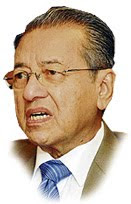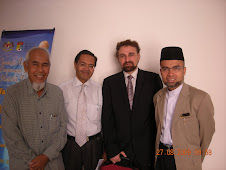2008/10/05
Safety net for bank depositors
By : TAN CHOE CHOE
Email to friend Print article
Malaysia Deposit Insurance Corporation chief executive Jean Pierre Sabourin
With news about banks failing in other parts of the world, should we worry about our money in the bank? Malaysia Deposit Insurance Corporation chief executive Jean Pierre Sabourin tells TAN CHOE CHOE that our deposits are quite safe and our accounts are insured by the government — at least up to RM60,000 each
Q: French President Nicolas Sarkozy recently said millions of people around the world are worried about their savings. Is it the same here?
A: No. But this is an issue that's being addressed around the world every day.
We've seen, in the last couple of weeks, the concerns about AIG, bank failures in the United States and the bank run in Hong Kong... Depositors want to know "how do I protect my money?"
As to concerns about Malaysian banks, the question is not whether they are going to fail because our banks are very robust, very profitable.
They're insulated from events in the US because local banks are not involved in the US markets.
But the public should be aware of what's going on, especially if they follow CNN or other media and see the concerns of depositors around the world.
Q: So is the public making more calls expressing concern over the global economic situation?
A: Our approach to deposit insurance is to inform the public. The public must understand the kind of protection they enjoy so that they are confident about the banking system.
We did more advertising last month, so there have definitely been more calls.
While most were about how deposit insurance works and its features, we had a few callers asking if local banks were in trouble, with bank failures around the world.
We'd like to think that one of the reasons we are not seeing panic here is because the public has a lot of confidence in our banks, in Bank Negara and the Malaysia Deposit Insurance Corporation (PIDM). We are, as a financial system, managing our affairs appropriately.
In the last three years, we've been building our system and practices and approaches so that in case there is a problem in any of our member banks, we can go in quickly and fix it. We don't wait until banks fail.
We work very closely with Bank Negara to ensure our depositors are protected.
We try to meet our statutory responsibility, which is to inform the public of the protection afforded them.
Q: What is deposit insurance and how does it benefit me?
A: The deposit insurance system was introduced in September 2005. It's an initiative of the Financial Sector Master Plan to enhance depositor protection in Malaysia.
It is a form of protection or guarantee for money placed in member institutions, usually banks and financial institutions.
Membership in the deposit insurance system is mandatory under the PIDM Act 2005 for all commercial and Islamic banks, both domestic and foreign.
In the unlikely event of a bank failure, depositors will be promptly reimbursed up to the coverage limit of RM60,000.
Q: Why does it cover up to RM60,000 only?
A: Don't only look at the RM60,000. Look at the total coverage.
You're getting RM60,000 per depositor, per member institution. There are 36 banks -- 22 conventional and 14 Islamic.
You can put RM60,000 in each of the 36 banks. You can also have a joint account with your family members or friends and that's insured separately.
That means you can also put RM60,000 in joint accounts in 36 different banks. Or if you set up a trust account, you can do so in each of the 36 banks. In addition, Islamic deposits are insured separately.
If you're a small business, not incorporated, you get RM60,000 coverage. If you are an incorporated company, you get another RM60,000.
When Bank Negara did a study in 2004 and 2005, it found RM60,000 covers more than 90 per cent of the accounts but only 32 per cent of the value.
So the ones not fully covered are large accounts belonging to big corporations and businesses, and those with more money.
But that's a small number because not everybody's rich. It's really corporations and businesses that hold a lot of money in the banking system.
And when we're looking at deposit protection, we look at the issue of what is called moral hazard.
In a nutshell, we're trying to balance between having large depositors to provide market discipline and protecting the small unsophisticated depositors.
The big players don't care about the RM60,000 limit when they've got hundreds of millions of ringgit. So they monitor the performance of the banks because they've got more at stake.
We shouldn't expect the average depositor to do that because few people really understand complex financial services.
At PIDM, we act as proxy for all the small depositors and monitor the banks.
Q: What authority is vested with PIDM?
A: The PIDM Act 2005 spells out our mandate, which is to administer a deposit insurance system efficiently and effectively, promote confidence in the financial system and to promote sound risk management in our financial institutions.
For example, we have put in place this year, a new differential premium systems whereby banks having higher risk profiles pay higher premiums.
This gives banks financial incentives to fix any problems that they may have -- so the onus is on our member banks to act quickly to save money.
Q: So should I worry about the safety of my accounts now?
A: It depends. I want to emphasise that I am not saying you should have all your money in bank deposits.
It depends on your risk appetite. You may park some money in savings accounts, some in real estate, some in stocks. You have to look at spreading your risks.
But if protecting your bank deposits is your major concern, you should find out how it works and how to protect your money.
Q: My spouse and I have a joint-chequing account and individual savings accounts at the same bank. How are we covered?
A: In the same member bank, you and your spouse are individually protected up to RM60,000 on each of your individual savings accounts.
In addition, both of you enjoy separate protection of up to RM60,000 for the joint account. Therefore, the total deposit insurance protection in this instance is RM180,000.
Q: What if I hold an Islamic banking account?
A: Eligible Islamic deposits placed in Islamic banks are also protected by PIDM.
Furthermore, a depositor holding both conventional and Islamic deposits within the same member bank or group will enjoy separate coverage of up to RM60,000 on the conventional and Islamic deposits respectively.
Q: What happens to my deposit if two member banks merge?
A: You will continue to enjoy separate insurance coverage for a period of two years for each of your deposit accounts after the date of the merger, or upon maturity of the deposit (if it's a term deposit) or until you withdraw the deposit, whichever is earlier.
What we would do is to make sure you are informed that there is a merger and what happens to your deposit insurance coverage.
Q: Do joint accounts and trust accounts enjoy separate deposit insurance coverage?
A: Yes. Joint accounts enjoy separate deposit insurance protection limit, provided the records of the member bank disclose the names of the joint account holders.
Trust accounts also enjoy separate deposit insurance protection limit, provided the information on trust account beneficiaries and their respective interests in the deposit is disclosed on the records of the member bank.
Q: How can I maximise protection for my deposits in a single bank?
A: Each account is protected up to the RM60,000 limit.
For example, John holds an individual account; has a joint account with his wife; has a joint account with his daughter and wife; has another under the name of his legal firm; and another under his trading company.
Each of these accounts is covered up to the RM60,000 maximum. So John, with his five accounts, would be covered up to RM300,000.
Q: Can I buy additional insurance for my deposits if it's more than RM60,000?
A: No.
Q: How do I make a deposit insurance claim?
A: In the unlikely event of a member bank failure, PIDM will announce when (within three months) and how you will be reimbursed.
Q: If I walk into a bank now and open an account, how will I know if the product is insured by PIDM or not?
A: We're coming up with a new information regulation. It'll be in place by year-end.
We've been working with the banks for a year now, going through their products, deposits and documentation to determine which product is insurable and which isn't.
So when a depositor opens an account, the bank has to give him a brochure informing him whether the product qualifies for a deposit insurance.
If the bank is selling you a unit trust, they have to tell you it's not insured.
Q: Do I have to fill up any form to get back my money when a bank fails?
A: No. We'll do it all for you.
But we are proactive and do not wait until a bank fails to act. Our job is to move in quickly and fix any problems before a bank fails.
Q: Do you take over the bank?
A: When a bank is showing signs of problems, Bank Negara will inform us and we'll send in our team to check the extent of the problems. We'll look at the options available to resolve the problems and calculate the costs.
We can ask shareholders to put in more capital, sell off the bank's assets, or look for a willing buyer.
If there isn't, we may need to liquidate the bank.
Our board of directors, which includes the governor of Bank Negara and the secretary-general of the Ministry of Finance, will look at the least-cost option.
If we look at (American bank) Wachovia, their depositors today are now depositors of Citibank -- and that happened overnight.
That's one of the methods we could use -- take over the bank and sell it to somebody else.
Q: How much premium has PIDM collected so far?
A: About RM300 million. On average, we collect about RM100 million a year. That's less than one per cent of the annual profits of the banks.
It's minimal. The reason for that is because we don't have any expectations of failures.
Q: How does PIDM monitor its members to ensure they are practising prudent financial management?
A: We get the supervisory reports from Bank Negara and we will assess all the risks.
We have a risk-assessment model which we implemented this year.
Drawing on the supervisory reports, we will do tracking, trend-analysis and look at the key ratios.
If there's any problem, we'll discus it with Bank Negara and they'll meet with the banks or we'll meet with the banks directly to check the problem
Subscribe to:
Post Comments (Atom)







































No comments:
Post a Comment